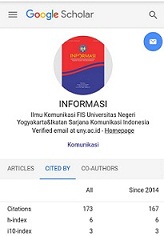Investigating the correlation between teachers’ instructional communication and students’ motivation: A quantitative study
Josi Nur Panuntas Al Amin, Universitas Islam 45 Bekasi, Indonesia
Abstract
There is an anecdotal evidence that teachers’ instruction communication can affect students’ communication. Thus, the present study aims to investigate the correlation between teachers’ instructional communication and students’ motivation. The present study applies a quantitative approach by distributing a set of questionnaires to 52 participants in a senior high school in Bekasi, Indonesia. The findings of the present study indicate a strong correlation between teachers’ instruction communication and students’ motivation. In addition, the most salient factors of teachers’ instructional communication are feedback and organization of instructional units or teachers’ ability to deliver the materials. Regarding students’ motivation, the majority of the respondents are motivated by integrated regulation. The latter refers to the respondents’ ability to internalize their goals. It can be said that feedback and teachers’ ability to present learning materials in an engaging manner can help students to see the merits behind their learning process and internalize the goals. The present study also discuss the implications and further studies.
Keywords
Full Text:
PDFReferences
Abun, D. (2018). Academic Self-Regulation of STEM of Senior High School Students of Divine Word Colleges in Region I, Philippines and Their Academic Performance. TEXILA INTERNATIONAL JOURNAL OF ACADEMIC RESEARCH, 5(1). https://doi.org/10.21522/tijar.2014.05.01.art003
Adara, R., Puspahaty, N., Nuryadi, N., & Utama, W. (2021). Investigating efl teachers ’motivational strategies during covid-19 pandemic. The 2nd International Conference on Inovations in Social Sciences Education and Engineering (ICoISSEE) August 07th, 2021.
Adara, R. A., & Haqiyah, A. (2021). Improving Indonesian EFL Learners’ Motivation Through Computer Assisted Learning (CALL). Journal of English Language Studies, 6(1), 110. https://doi.org/10.30870/jels.v6i1.9119
Adara, R., & Haqiyah, A. (2020). The Effects of Integrating Digital Storytelling to Students’ Motivation. Edukasi: Jurnal Pendidikan Dan Pengajaran, 131–145. https://doi.org/10.19109/ejpp.v7i2.6023
Alenezi, M. (2023). Digital Learning and Digital Institution in Higher Education. Education Sciences, 13(1). https://doi.org/10.3390/educsci13010088
Amin, A., Alimni, A., Kurniawan, D. A., Triani, E., & Pratama, W. A. (2022). Implications of Teacher Interpersonal Communication Ability on Student Learning Motivation in Islamic Religious Education Lessons During Pandemic. Journal of Education Research and Evaluation, 6(1). https://doi.org/10.23887/jere.v6i1.39547
Bimas Saputra, E. (2022). The effect of teacher communication ability and learning motivation on student learning outcomes in economic lessons for class xi IPS SMA Ekasakti in Padang academic year 2015/2016. Journal International on Global Education, 1(1), 1–10. https://doi.org/10.31933/jige.v1i1.532
Borgstede, M., & Scholz, M. (2021). Quantitative and Qualitative Approaches to Generalization and Replication–A Representationalist View. Frontiers in Psychology, 12. https://doi.org/10.3389/fpsyg.2021.605191
Brühlmann, F., Vollenwyder, B., Opwis, K., & Mekler, E. D. (2018). Measuring the “why” of interaction: Development and validation of the User Motivation Inventory (UMI). Conference on Human Factors in Computing Systems - Proceedings, 2018-April. https://doi.org/10.1145/3173574.3173680
Conley, N. A., & Ah Yun, K. (2017). A survey of instructional communication: 15 years of research in review. Communication Education, 66(4). https://doi.org/10.1080/03634523.2017.1348611
Credé, M., & Phillips, L. A. (2011). A meta-analytic review of the Motivated Strategies for Learning Questionnaire. Learning and Individual Differences, 21(4). https://doi.org/10.1016/j.lindif.2011.03.002
Deci, E. L., Olafsen, A. H., & Ryan, R. M. (2017). Self-Determination Theory in Work Organizations: The State of a Science. Annual Review of Organizational Psychology and Organizational Behavior, 4(1), 19–43. https://doi.org/10.1146/annurev-orgpsych-032516-113108
Fajri, C. (2020). Teacher’s emphatic communication to improve learning motivation of special needs students. International Journal of Communication and Society, 2(1). https://doi.org/10.31763/ijcs.v2i1.77
Filgona, J., Sakiyo, J., Gwany, D. M., & Okoronka, A. U. (2020). Motivation in Learning. Asian Journal of Education and Social Studies, 16–37. https://doi.org/10.9734/ajess/2020/v10i430273
Gopalan, V., Bakar, J. A. A., Zulkifli, A. N., Alwi, A., & Mat, R. C. (2017). A review of the motivation theories in learning. AIP Conference Proceedings, 1891. https://doi.org/10.1063/1.5005376
Han, Y., & Xu, Y. (2020). The development of student feedback literacy: the influences of teacher feedback on peer feedback. Assessment and Evaluation in Higher Education, 45(5). https://doi.org/10.1080/02602938.2019.1689545
Hardani, A., ustiawaty, jumari, & Andriani, H. (2020). Buku Metode Penelitian Kualitatif & Kuantitatif.
Hariyanto, F. (2018). Instructional communications at early childhood education (PAUD) at-Taqwa Karawang Descriptive Qualitative Studies about Communications Instructional in Teaching and Learning Process at PAUD At-Taqwa Karawang. Jurnal Politikom Indonesiana, 3(1).
Howard, J. L., Bureau, J., Guay, F., Chong, J. X. Y., & Ryan, R. M. (2021). Student Motivation and Associated Outcomes: A Meta-Analysis From Self-Determination Theory. Perspectives on Psychological Science, 16(6). https://doi.org/10.1177/1745691620966789
Huang, C. (2011). Self-concept and academic achievement: A meta-analysis of longitudinal relations. Journal of School Psychology, 49(5), 505–528. https://doi.org/10.1016/j.jsp.2011.07.001
Hulleman, C. S., Schrager, S. M., Bodmann, S. M., & Harackiewicz, J. M. (2010). A meta-analytic review of achievement goal measures: Different labels for the same constructs or different constructs with similar labels? Psychological Bulletin, 136(3), 422–449. https://doi.org/10.1037/a0018947
Irianto, N. A., . I., & Sabaruddin, S. (2019). An analysis of pronunciation errors of english consonants : /?/ and /ð/ by the students of the english education study program of University of Bengkulu. Journal of English Education and Teaching, 2(3). https://doi.org/10.33369/jeet.2.3.18-28
Istiqamah, I., Baa, S., & Samtidar, S. (2023). Teachers’ non-verbal communication influencing students’ motivation in learning english for the young learners. Klasikal: Journal of Education, Language Teaching and Science, 5(1), 1–24. https://doi.org/10.52208/klasikal.v5i1.611
Joko, J. (2018). Komunikasi instruksional guru dalam menumbuhkan motivasi belajar siswa (studi komunikator pada SMPN 5 Kendari). Widya Komunika, 8(2), 98. https://doi.org/10.20884/1.wk.2018.8.2.1409
Khartha, A., Baa, S., & Korompot, C. A. (2022). Teacher’s interpersonal communication and its impacts on students’ motivation in efl learning. Klasikal: Journal of Education, Language Teaching and Science, 4(1), 156–169. https://doi.org/10.52208/klasikal.v4i1.137
Khoiroh, M. (2016). Pengaruh komunikasi instruksional guru dalam pembelajaran bahasa Indonesia terhadap mindset positif pada siswa SDN Pakukerto 1 Sukorejo Kabupaten Pasuruan. Universitas Islam Negeri Maulana Malik Ibrahim.
Kırkağaç, Ş., & Öz, H. (2017). The role of academic motivation in predicting preservice EFL teachers’ achievement. Journal of Language and Linguistic Studies, 13(2).
Kriyantono, R. (2006). Teknik Praktis Riset komunikasi - Rachmat Kriyantono, S.Sos., M.Si - Google Books. Kencana Prenada Media Group.
Kyaruzi, F., Strijbos, J. W., Ufer, S., & Brown, G. T. L. (2019). Students’ formative assessment perceptions, feedback use and mathematics performance in secondary schools in Tanzania. Assessment in Education: Principles, Policy and Practice, 26(3). https://doi.org/10.1080/0969594X.2019.1593103
Liu, Y. (2014). Motivation and Attitude: Two Important Non-Intelligence Factors to Arouse Students’ Potentialities in Learning English. Creative Education, 05(14). https://doi.org/10.4236/ce.2014.514140
Ma, H., Kwon, J., & Ahn, J. (2023). The impact of regulations and motivations on behavioural intentions of customers with self-service technology difficulties. Current Issues in Tourism. https://doi.org/10.1080/13683500.2023.2173056
Mamoon-Al-Bashir, M., Kabir, M. R., & Rahman, I. (2016). The Value and Effectiveness of Feedback in Improving Students’ Learning and Professionalizing Teaching in Higher Education. Journal of Education and Practice, 7(16).
Megawati, W., & Hartono, R. (2020). The Impact of Teachersâ€TM Verbal and Non-Verbal Communication on Studentsâ€TM Motivation in Learning English. English Education Journal, 10(4), 436–448. https://doi.org/10.15294/eej.v10i4.39157
Möller, J., Pohlmann, B., Köller, O., & Marsh, H. W. (2009). A Meta-Analytic Path Analysis of the Internal/External Frame of Reference Model of Academic Achievement and Academic Self-Concept. Review of Educational Research, 79(3), 1129–1167. https://doi.org/10.3102/0034654309337522
Mupa, P., & Chinooneka, T. I. (2015). Factors contributing to ineffective teaching and learning in primary schools: Why are schools in decadence? Journal of Education and Practice, 6(19).
Neupane Bastola, M., & Hu, G. (2021). Supervisory feedback across disciplines: does it meet students’ expectations? Assessment and Evaluation in Higher Education, 46(3). https://doi.org/10.1080/02602938.2020.1780562
Omer, A. A., & Abdularhim, M. (2017). The criteria of constructive feedback: The feedback that counts. Journal of Health Specialties, 5(1). https://doi.org/10.4103/2468-6360.198798
Preiss, R. W., & Wheeless, L. R. (2014). Perspectives on Instructional Communication’s Historical Path to the Future. Communication Education, 63(4). https://doi.org/10.1080/03634523.2014.910605
Ramani, S., Könings, K. D., Ginsburg, S., & van der Vleuten, C. P. (2019). Feedback Redefined: Principles and Practice. Journal of General Internal Medicine, 34(5). https://doi.org/10.1007/s11606-019-04874-2
Riduwan. (2010). Belajar Mudah Penelitian untuk Guru, Karyawan, dan Peneliti Pemula. Alfabeta.
Ryan, R. M., & Deci, E. L. (2020). Intrinsic and extrinsic motivation from a self-determination theory perspective: Definitions, theory, practices, and future directions. Contemporary Educational Psychology, 61. https://doi.org/10.1016/j.cedpsych.2020.101860
Ryan, & Deci. (2017). Self-Determination Theory: Basic Psychological Needs in Motivation, Development, and Wellness. In Self-Determination Theory: Basic Psychological Needs in Motivation, Development, and Wellness. https://doi.org/10.1521/978.14625/28806
Sadirman, A. . (2016). Interaksi dan Motivasi Belajar Mengajar. PT Raja Grafindo.
Santoso, A. (2013). Hubungan kepuasan penilaian kinerja dan motivasi kerja karyawan pada hotel Sriwijaya Semarang. Prodi Manajemen UNIKA Soegijapranata.
Schwab, S., Markus, S., & Hassani, S. (2022). Teachers’ feedback in the context of students’ social acceptance, students’ well-being in school and students’ emotions. Educational Studies. https://doi.org/10.1080/03055698.2021.2023475
Shintiyana, A. A. (2020). Komunikasi Instruksional Guru dalam Meningkatkan Keterampilan Sosial Anak Berkebutuhan Khusus di Sekolah Inklusif Galuh Handayani Surabaya. Commercium, 3(2).
Sugiyono. (2017). Metode Penelitian Kuantitatif, Kualitatif Dan R&D.
Thadi, R. (2019). Proses Komunikasi Instruksional dalam Pembelajaran Vokasional. Journal of Education and Instruction (JOEAI), 2(1). https://doi.org/10.31539/joeai.v2i1.614
Torudomsak, S., Buranarom, P., Thummacho, T., & Panthong, J. (2021). The comparison of self-determination regulators between high school students attending ordinary and tutorial schools in Thailand. International Journal of Medical Science and Health Research, 05. https://doi.org/10.51505/ijmshr.2021.5503
Utomo, B. B. (2019). Pengaruh Komunikasi Instruksional dan Lingkungan Belajar Terhadap Prestasi Akademik Melalui Motivasi Belajar Mahasiswa Jurusan Ilmu Komunikasi Universitas Diponegoro Semarang Tahun Angkatan. Universitas Diponegoro
Van den Broeck, A., Howard, J. L., Van Vaerenbergh, Y., Leroy, H., & Gagné, M. (2021). Beyond intrinsic and extrinsic motivation: A meta-analysis on self-determination theory’s multidimensional conceptualization of work motivation. Organizational Psychology Review, 11(3). https://doi.org/10.1177/20413866211006173
Vasconcellos, D., Parker, P. D., Hilland, T., Cinelli, R., Owen, K. B., Kapsal, N., Lee, J., Antczak, D., Ntoumanis, N., Ryan, R. M., & Lonsdale, C. (2020). Self-determination theory applied to physical education: A systematic review and meta-analysis. Journal of Educational Psychology, 112(7), 1444–1469. https://doi.org/10.1037/edu0000420
Webster, C. A. (2010). Increasing Student Motivation Through Teacher Communication. Journal of Physical Education, Recreation & Dance, 81(2). https://doi.org/10.1080/07303084.2010.10598431
Whitfield, K. M., Dresser, J. D., Magoffin, R., & Wilby, K. J. (2021). Maintaining and maximising motivation to progress scholarly work during challenges times – Reflections from the pandemic. In Currents in Pharmacy Teaching and Learning (Vol. 13, Issue 3). https://doi.org/10.1016/j.cptl.2020.10.017
Woolfolk, A. (2019). Educational Psychology. Pearson.
Yusuf, P. M. (2010). Komunikasi instruksional: teori dan praktik. Bumi Aksara.
Zamarripa, J., Castillo, I., Baños, R., Delgado, M., & Álvarez, O. (2018). Motivational regulations across the stages of change for exercise in the general population of Monterrey (Mexico). Frontiers in Psychology, 9(DEC). https://doi.org/10.3389/fpsyg.2018.02368
Zhang, J., Zhang, Y., Song, Y., & Gong, Z. (2016). The different relations of extrinsic, introjected, identified regulation and intrinsic motivation on employees’ performance: Empirical studies following self-determination theory. Management Decision, 54(10). https://doi.org/10.1108/MD-01-2016-0007
DOI: https://doi.org/10.21831/informasi.v53i2.62164
Refbacks
- There are currently no refbacks.
Copyright (c) 2024 Reza Anggriyashati Adara, Josi Nur Panuntas Al Amin
Supervised by
Our Journal has been Indexed by:
Informasi by http://journal.uny.ac.id/index.php/informasi is licensed under a Creative Commons Attribution-NonCommercial 4.0 International License.














